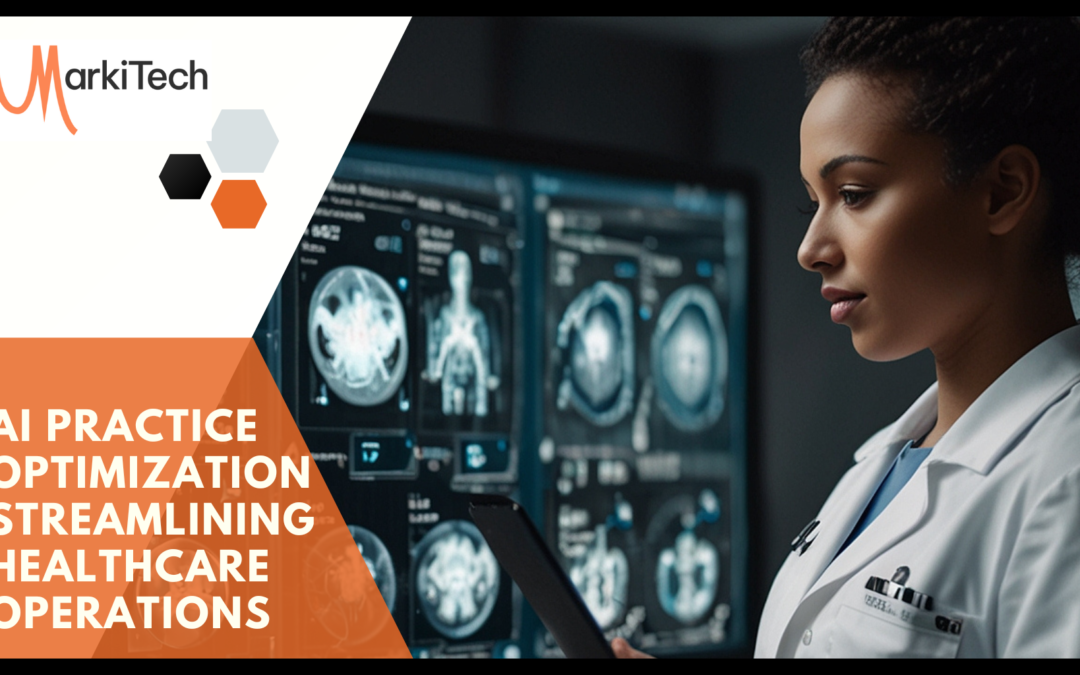Medically Reviewed: Dr Alex Evans
Image Credit: Canva
Introduction
In this fast changing society, effectiveness is the key to many challenges, especially in this competitive sector of health care. With the increase in the need for healthcare services, another important factor comes into consideration is the management of healthcare operations. And this is where practice optimization AI comes in. Using artificial intelligence in the healthcare sector makes the processes easier and eliminates some barriers which can provide better patient care. At MarkiTech, we are committed to the improvement of both quality of service delivery and patient outcomes in healthcare by harnessing the power of artificial intelligence. It is time to discuss how AI is being integrated into the healthcare systems and enhance the practical functioning.
What is Practice Optimization AI?
Optimization AI relates to the application of artificial intelligence techniques within practices in healthcare facilities. That is the use of automation and IT based solutions to complete administrative tasks and support patient data, schedule and other applications in healthcare organizations. It enables health care professionals to concentrate much of their time diagnosing patients’ ailments rather than writing reports which greatly makes the whole process efficient.
The Benefits of AI for Healthcare Efficiency
I offers numerous benefits when it comes to optimizing healthcare practices:
- Reducing Administrative Burden: This paper identifies one of the key benefits of AI to healthcare providers to be the handling of paperwork. One of the most common problems that healthcare providers face, besides the shortage of qualified staff, is performing numerous clerical tasks. As for AI for healthcare efficiency, these tasks are typically routine and can be completed by an AI system, leaving more time for healthcare providers to devote to their patients. For instance, it may assist in keeping patients’ records, billing, and insurance claims that will in turn ease the burden on human personnel.
- Improving Patient Scheduling: Scheduling patients’ appointments is very important in the running of any medical practice. AI has the capability of scheduling since it can analyze data of patients, appointment history, and provider availability in order to come up with the most appropriate time thus APPENA. This makes it possible for the healthcare providers to make the most out of the time they have while making sure that you don’t have so many patients awaiting your attention or making sure that the few patients you have are not the only ones taking much of your time. About scheduling, through AI, one is able to increase the patient’s satisfaction while at the same time managing the operations effectively.
- Enhancing Patient Care Coordination: AI also enhances patient care coordination through the supply of patient data to the healthcare providers in an easy way. Through the use of AI, physicians and other caregivers can easily consult records of the patients and their past treatment as well as their health history, which will be vital in the treatment of the patients. It also makes the health care quality to be better as well as minimizing the errors that occur hence making health care safer for the patient.
How Healthcare Operations AI Works
AI can streamline healthcare operations in several ways:
- Data Management and Analysis: Electronic health records alone produce huge volumes of data daily and this has been compounded by other sources such as treatment results. This data can be handled and analyzed by AI and made available to the healthcare providers’ meaningful information concerning the patients, the treatments being provided and the performances of the healthcare facilities. By analyzing data using healthcare operations AI, it can have the capability of analyzing trends, foresee the future requirements, and recommend the right actions that healthcare providers ought to undertake.
- Automating Routine Tasks: AI can automate routine tasks such as appointment reminders, prescription refills, and follow-up notifications. This automation not only saves time but also ensures that patients receive timely reminders and follow-ups, improving their adherence to treatment plans. By automating routine tasks, AI helps healthcare providers focus on more complex and critical aspects of patient care.
- Optimizing Resource Allocation: Combining this with other types of AI the capacity can be utilized more effectively as the demand for services is predictable by AI systems. For instance, AI can use patients’ records to determine when certain services are busiest and then recommend the right arrangements of human personnel and requisite resources. This means that insurers are ready to satisfy the needs of the patients and make the processes within the healthcare system significantly more efficient.
MarkiTech’s Role in Practice Optimization AI
Being the company of digital transformation experts, MarkiTech offers support to the representatives of the healthcare industry to introduce more effective opportunities of artificial intelligence into their processes. We present AI services which facilitate healthcare organizations, decrease the level of bureaucracy, and increase productivity. The ultimate aim is to promote better value in healthcare, thus enabling providers to give the best care possible to patients.
The Future of AI in Healthcare Operations
Combined with the positive attitude towards new technology, any solutions for healthcare operations improvement almost always can’t lead to negative consequences. The remarkable advancement of AI technology will improve even more the analytics tools and other solutions within the health systems management. Whether it’s using predictive analytics or next-gen automation, AI will have an even greater impact on healthcare in the future.
Conclusion:
Optimization AI application is changing the paradigm of operational management within health care organizations. It is helping in addressing the administrative overload: in the organization of patients’ appointments, and in the delivery of healthcare services. At MarkiTech, we are happy to be in the center of this change by offering simple and efficient AI solutions for healthcare management and improvement of the patients’ treatment process. Thanks to such innovations, healthcare providers can rest assured that they will be able to provide quality care while also being highly productive, making way for a brighter future.
MarkiTechhas various subsidiaries with products and services targeted towards digital healthcare and telehealth/telemedicine and virtual clinics with a laser focus on helping seniors age in place and help their caregivers.
Sensights.aiis a company focused on remote patient monitoring and aging solutions, which utilizes artificial intelligence to track the health of patients and keep a round-the-clock connection between caregivers and patients.
As well, Veyetalsuses PPG and AI modeling algorithms to capture the light reflected by the blood vessels under a patient’s skin to measure vitals anytime, anywhere.
Lastly, we have now launched our latest Mental Health AI Scribe tool called CliniScripts.com




